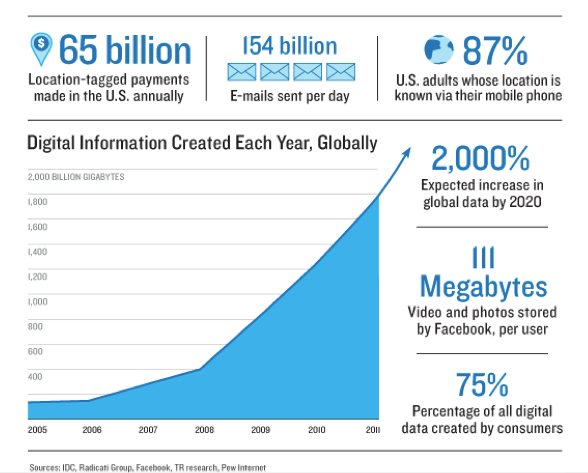Pundits and hackers are up in arms about the vast government surveillance PRISM network revealed by NSA leaker Edward Snowden. They’ve charged that U.S. overreach has turned the country into an Orwellian nightmare in which the government provides the illusion of privacy while it collects massive amounts of data on all Americans.
But so far, this outrage has failed to spread to the general public. According to a June poll by the Pew Research Center and The Washington Post, 56 percent of the American public approves of the NSA’s actions. Some 62 percent believe the federal government should investigate terrorism even if it invades personal privacy.
“The media is having a collective freak-out,” said Nita Rollins, a futurist at Resource, a digital marketing agency in Columbus, OH. “I’m not sure consumers are reacting that way.”
RELATED: HOW EDWARD SNOWDEN COULD DERAIL THE GLOBAL ECONOMY
Consumers are ambivalent about PRISM because they voluntarily give up personal information each day. According to a 2011 Forrester survey, Americans are much more comfortable than Europeans with sharing personal information online. For years, Americans have voluntarily posted details of their lives to corporations, social media, hospitals, websites and financial institutions. Few know or seem to care how this information is being used or might be used in the future.
This naiveté extends to our online browsing habits. According to a 2012 study by the Berkeley Center for Law and Technology, 90 percent of web users don't know their activity is being tracked.
Facebook is the best example of this. As I noted in the days after the onset of the Snowden saga, intimate details of the lives of my Facebook “friends” are easily deducible from their posts, from where they work to where their kids go to school to what their politics are. Few give much thought to the fact that Facebook is actually collecting this information. When it emerged that the company was sharing this information with the government, some people were outraged – but most kept right on posting.
RELATED: NSA DATA MINING RAISES EYEBROWS AMONG U.S. ALLIES
Social media is just the beginning. How many times have you volunteered your Social Security number to a private company – or shared your address, marital status or the number of kids you have to a website? How many online purchases have you made without reminding yourself that the company will use the information about your purchases to market other products to you?
Most of us volunteer this kind of information at least once a day – and implicitly trust companies to protect it. Young people are getting savvier at protecting their information online. Sixty percent of teens employ some form of protection on the data they share on social networks like Facebook, according to a May 2013 Pew Internet report. The chart below illustrates just how much is given up each year.

BIG DATA AND BIG BUSINESS
According to Rollins, this information improves – not detracts from – the consumer experience.
“You can’t get good recommendations from Amazon and Netflix unless they track your past purchases and the purchases of people like you,” she said. “These retailers have figured out how to make big data provide better product recommendations.”
RELATED: HOW YOU’RE SHAPING THE FUTURE THROUGH ‘BIG DATA’
The NSA revelations expose the downside of this consumer-company relationship. But Rollins said it would not change consumer habits.
“We are naïve collaborators with retailers in terms of using our personal data,” she said. “We’re reacting with fear that the government has a back door into our beloved search engines and social network. The furor will die down faster than we ever imagine.”
In fact, a recent National Journal poll backs this up. It showed that while Americans don’t like surveillance, they are already resigned to invasive snooping.
The massive amounts of information collected by companies is not just being stored on servers. Businesses are using this to market to consumers and improve production methods.
Rollins said that the data collected by companies now allows them to pinpoint core consumers. This would lead the next revolution in the way businesses advertise and manufacture.
Take Nike, for example. According to Rollins, the company is using the data it has collected to create products that their core consumers want – for instance, a running shoe targeted toward a very small subset of runners. It is also basing decisions on how much of the product to manufacture based on collected data.
“Nike wants to get to the point where their marketing is so closed-loop there’s less excess inventory heading to the landfills of the world,” she said.
Surveys show this targeted strategy is working. A February 2013 report from the marketing firm MyBuys found that two thirds of customers shop at stores that tailor promotions and sales based on their buying history, while 54 percent are willing to share information to improve the shopping experience. Recent reports also confirm that the sharing of information by Google and Microsoft has done little to hurt their brands.
THE NEXT FRONTIER
In the future, Rollins predicts that companies will be able to collect real-time information on our bodies. The data might be collected for medical purposes, but would also be available to sell to private companies and be collected by the government. Rollins believes this is a good thing.
“Is this good for companies and is it good for consumers? Yes, it’s better. It can be frightening,” she said. “But the more personalized brand messaging becomes, the more we perfect the feedback loop between what we like and companies produce.”





